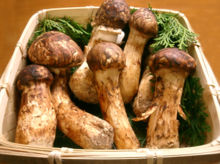松茸
Appearance
Chinese
[edit]| pine | confused; fluffy; luxuriant growth | ||
|---|---|---|---|
| trad. (松茸) | 松 | 茸 | |
| simp. #(松茸) | 松 | 茸 | |
Pronunciation
[edit]- Mandarin
- (Standard Chinese)+
- Hanyu Pinyin:
- Zhuyin: ㄙㄨㄥ ㄖㄨㄥˊ
- Tongyong Pinyin: songróng
- Wade–Giles: sung1-jung2
- Yale: sūng-rúng
- Gwoyeu Romatzyh: songrong
- Palladius: сунжун (sunžun)
- Sinological IPA (key): /sʊŋ⁵⁵ ʐʊŋ³⁵/
- (Standard Chinese)+
- Southern Min
- (Hokkien: General Taiwanese)
- Pe̍h-ōe-jī: siông-liông
- Tâi-lô: siông-liông
- Phofsit Daibuun: sionglioong
- IPA (Taipei): /siɔŋ²⁴⁻¹¹ liɔŋ²⁴/
- (Hokkien: General Taiwanese)
- Pe̍h-ōe-jī: siông-jiông
- Tâi-lô: siông-jiông
- Phofsit Daibuun: siongjioong
- IPA (Kaohsiung): /siɔŋ²³⁻³³ ziɔŋ²³/
- (Hokkien: General Taiwanese)
Noun
[edit]松茸
Synonyms
[edit]Compounds
[edit]- 姬松茸 (jīsōngróng)
Japanese
[edit]| Kanji in this term | |
|---|---|
| 松 | 茸 |
| まつ Grade: 4 |
たけ Jinmeiyō |
| kun'yomi | |
Etymology
[edit]Compound of 松 (matsu, “pine”) + 茸 (take, “mushroom”), as it grows under trees (particularly, but not exclusively, pine trees).
Pronunciation
[edit]- (Tokyo) まつたけ [màtsútáké] (Heiban – [0])[1][2]
- (Tokyo) まつたけ [màtsútáꜜkè] (Nakadaka – [3])[1]
- IPA(key): [ma̠t͡sɨta̠ke̞]
Noun
[edit]
Usage notes
[edit]As with many terms that name organisms, this term is often spelled in katakana, especially in biological contexts (where katakana is customary).
Derived terms
[edit]Descendants
[edit]- English: matsutake, himematsutake
References
[edit]- ↑ 1.0 1.1 Matsumura, Akira, editor (2006), 大辞林 [Daijirin] (in Japanese), Third edition, Tokyo: Sanseidō, →ISBN
- ^ NHK Broadcasting Culture Research Institute, editor (1998), NHK日本語発音アクセント辞典 [NHK Japanese Pronunciation Accent Dictionary] (in Japanese), Tokyo: NHK Publishing, Inc., →ISBN
Categories:
- Chinese lemmas
- Mandarin lemmas
- Hokkien lemmas
- Chinese nouns
- Mandarin nouns
- Hokkien nouns
- Chinese terms with IPA pronunciation
- Chinese terms spelled with 松
- Chinese terms spelled with 茸
- zh:Mushrooms
- Japanese terms spelled with 松 read as まつ
- Japanese terms spelled with 茸 read as たけ
- Japanese terms read with kun'yomi
- Japanese compound terms
- Japanese terms with IPA pronunciation
- Japanese lemmas
- Japanese nouns
- Japanese terms spelled with fourth grade kanji
- Japanese terms spelled with jinmeiyō kanji
- Japanese terms with 2 kanji
- ja:Euagarics


